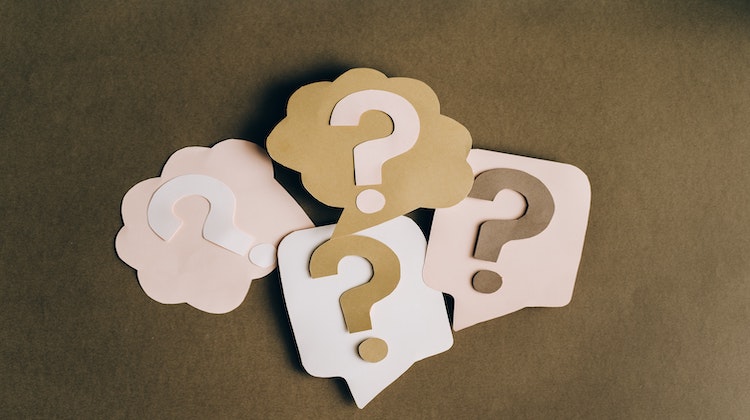This article will explain each of these question types, when to use them, and how to form them grammatically, and it will also help your speaking to sound more natural by explaining when to lift your voice at the end of your question, and when not to.
Read on to learn more about asking and answering questions in English!
General questions / yes-no questions
Perhaps the simplest and most common kind of questions are general questions, sometimes called yes/no questions. These are questions that expect a straightforward answer – usually “yes” or “no”, but sometimes also “maybe” or “I don’t know.” Examples of these questions include:
- Would you like a drink? (Yes)
- Do you need help with your bags? (No thank you)
- Can I go to the bathroom? (Yes)
- Is it raining today? (I don’t know)
Here is the grammatical structure for yes/no questions:
[Auxiliary Verb] + [Subject] + [Main Verb] + [Object]?
The grammatical form of these questions is very similar to a statement, but with one key difference: with a statement, the auxiliary verb follows the subject (e.g. “It is easy to understand questions in English”), whereas with a yes/no question the auxiliary verb comes first, followed by the subject (e.g. “Is it easy to understand questions in English?”). Of course, we also add a question mark at the end too.
When asking a question like this in English, you should lift your voice (also known as using ‘rising intonation’) on the last syllable; this tells the person you’re speaking to that you’re asking a question.
This is the foundation of English grammar rules. If you want to learn English online, you can also do more exercises on English learning websites.
The Wh-questions in English
The second type of question in English are wh-questions, which begin with a ‘question’ word: who, what, where, when, why, which, whose, or how. The answers to these questions are never ‘yes/no’, they need to provide more information. Some examples are:
- Who are you going to the cinema with? (I am going with Sarah.)
- What is the best way to get into town? (You can take the bus.)
- Where is the nearest library? (It’s in the center of town.)
- When will you arrive tomorrow? (I will arrive at 9 am.)
- Why do you want this job? (Because I think it suits my skills and experience.)
- Which car should I buy? (You should buy a sports car.)
- Whose dog is that? (It’s my friend’s dog.)
- How do you make a cheesecake? (You need biscuits, butter, cheese, and sugar.)
The grammatical structure for many wh-questions is:
[Wh-question word] + [Auxiliary Verb] + [Subject] (+ [Main Verb] + [Object])?
However, not all wh-questions follow this structure; this is because a subject is not always necessary for a wh-question (e.g. “What is that?”, and “Who wants a piece of cake?”).
When asking a wh-question, do not use a rising intonation at the end; the person you’re speaking to will know you’re asking a question because of the wh-question word.
Learn English choice or contrast questions
Now we come to the third type of question in English: choice (or contrast) questions. These questions give two or more options as possible answers, usually joined by the conjunction “or”. The answer can be given in short form or as a full sentence. Let’s take a look at some examples:
- Would you like coffee or tea? (I would like tea please/Tea please)
- Do you prefer the city or the countryside? (I prefer the countryside/The countryside)
- Are you a dog person, a cat person, or both? (I’m both!/Both!)
- Which paint color do you like best, green, blue or red? (I like the green best/Green)
Similar to the yes/no questions, the grammatical structure for choice questions is:
[Auxiliary Verb] + [Subject] + [Main Verb] + [Object] or [Object]?
Unlike with yes/no questions, however, don’t use a rising intonation at the end; in fact, if you listen to native speakers ask questions like these, you’ll hear that they usually lift their voice in the middle of the question, and drop back down at the end.
Disjunctive questions
The final type of question we’ll be looking at today is called disjunctive questions (sometimes also called a confirmation of tag questions). These questions are commonly used when we think we already know the answer to the question we want to ask, and are made up of two parts: the first is phrased as a statement (because we think we think it’s true), and the second part is the question in the opposite form, which asks for confirmation from the person you’re speaking to that the statement is true. Here’s how that looks:
- You’re not going out tonight, are you? (No, I’m staying in)
- I will make it to the train on time, won’t I? (I’m sure you will)
- She lives in London, doesn’t she? (Yes, she moved there last year)
- I’m right, aren’t I? (I think so)
- We need more books, don’t we? (Definitely)
You will notice that in each example when the statement is positive (e.g. I will make it to the train on time), the question uses the negative form of the same auxiliary verb (e.g. won’t I?) and the speaker expects a positive answer. Conversely, when the statement is negative (e.g. You’re not going out tonight) the question uses the positive form of the same auxiliary verb (e.g are you?) and the speaker expects a negative answer.
The answers to disjunctive questions are similar to yes/no questions, so when asking a question like this, use rising intonation on the last syllable.
Now you have learned English question words and sentences. There are also many English words with multiple meanings. Want to learn it? Join italki and study with 20,000 teachers.
Conclusion
You should now be able to tell the difference between the four most common types of questions in English, and understand what kind of answer is expected for each, as well as when to use rising intonation when asking a question.
You can find lots more material on question types on italki, such as this helpful article on learning English vocabulary, as well as many English teachers that specialize in teaching speaking and conversation.
I’m Emma, the author of this article and a professional teacher here on Italki; I specialize in writing, so if you’d like to develop your writing skills you can book a lesson with me here.







